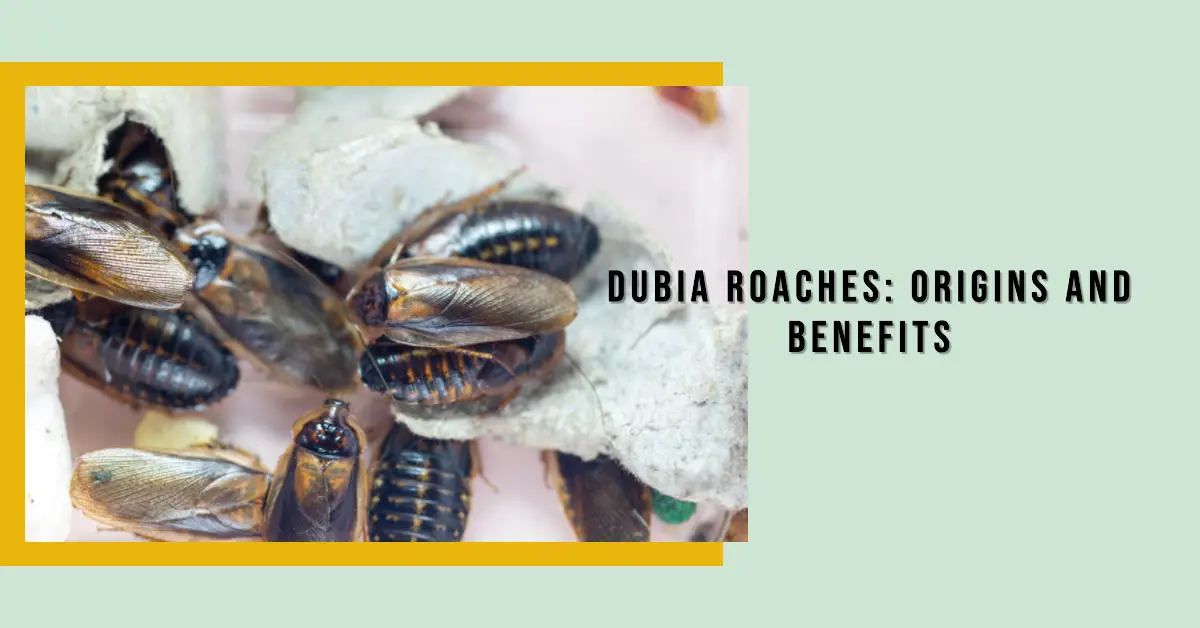
Jeffery Jago is a expert in horticulture and worm breeding. With a background in plant cultivation
Last Updated on March 28, 2023 by Jeffery Jago
When it comes to feeder insects for reptiles and amphibians, Dubia roaches have gained significant popularity among pet owners in recent years.
Understanding the origins of these insects, their benefits as a food source, and responsible breeding practices is essential for maintaining a healthy and thriving colony.
In this article, we’ll delve into the world of Dubia roaches and share some expert advice on keeping them as a feeder insect crop for your pets.

Origins of Dubia Roaches
Dubia roaches, also known as Guyana orange spotted roaches, are native to Central and South America, specifically Guyana, Suriname, and French Guiana.
They were first introduced to the pet trade in the United States in the early 2000s as feeder insects. Since then, their popularity has grown considerably, thanks to their numerous benefits as a food source for reptiles, amphibians, and other exotic pets.
Dubia roaches, also known as Guyana orange spotted roaches have been around for centuries, but they only gained popularity in the United States as a feeder insect in the early 2000s.
They are believed to have originated from Guyana, Suriname, and French Guiana, where they are commonly found in tropical rainforests and other humid environments.
Dubia roaches are typically found in leaf litter, under logs, and other areas with high humidity. They are known for their ability to adapt to a wide range of environmental conditions, which has helped them thrive in both their native habitat and in captivity.
In the wild, Dubia roaches are an important food source for many animals, including birds, reptiles, and amphibians. They are also scavengers, feeding on decaying plant material, dead insects, and other organic matter.
Dubia roaches were first introduced to the United States pet market in the early 2000s as a feeder insect. They quickly gained popularity due to their nutritional value, ease of maintenance, and low odor. They are now widely available in pet stores and online, and they are considered one of the best feeder insects for pets.
Despite their popularity, it’s important to note that Dubia roaches can be considered an invasive species in some areas outside of their native range. It’s important for pet owners to be responsible and not release them into the wild, as they can pose a threat to native species and ecosystems.
Benefits of Dubia Roaches as Feeder Insects
Dubia roaches have become a favorite choice among pet owners for several reasons:
- Nutritional benefits: Dubia roaches are rich in protein and low in fat, making them an excellent food source for maintaining the health of your pets. They also contain essential nutrients like calcium and vitamins, which contribute to the well-being of your animals.
- Low maintenance and safety factors: Unlike some other feeder insects, Dubia roaches are easy to care for and breed. They do not make noise, emit unpleasant odors, or carry diseases that could harm your pets. Additionally, they are less likely to bite or escape, making them a safer option for pet owners.
Invasive Species Concerns
Dubia roaches can be considered an invasive species in some areas outside of their native range, including parts of the United States. The potential impact of invasive species on native ecosystems and biodiversity is a significant concern.
If Dubia roaches were to escape or be released into the wild, they could potentially establish themselves and compete with native species for resources, leading to negative impacts on local ecosystems.
In addition, they could potentially serve as carriers of diseases or parasites that could be transmitted to native species.
To prevent the establishment of Dubia roaches in non-native areas, it is essential to practice responsible breeding and containment.
This can involve keeping roaches in secure enclosures with proper ventilation and feeding, and taking measures to prevent escapes, such as using screened lids and regularly checking enclosures for any potential escape routes.
It’s also important to note that some states and countries have regulations or restrictions on the possession and breeding of Dubia roaches. Before acquiring Dubia roaches, it’s important to research local laws and regulations and ensure compliance.
Conclusion
Dubia roaches, native to Central and South America, have become a popular choice as feeder insects for reptiles, amphibians, and other exotic pets.
Their nutritional benefits, low maintenance, and safety factors make them an attractive option for pet owners.


